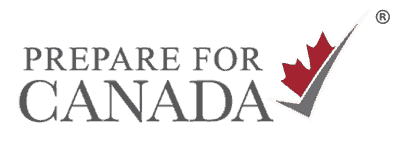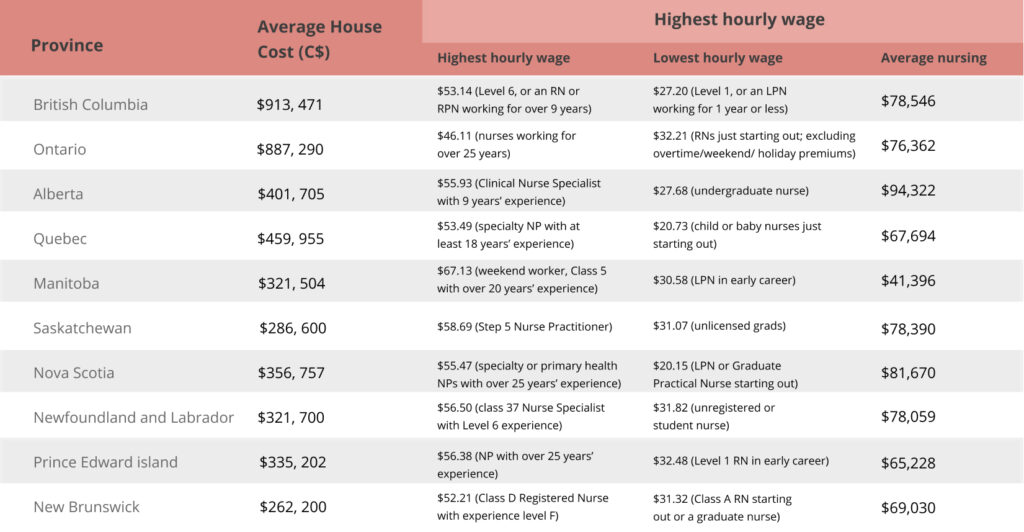How to move to Canada as a nurse
Nurses are integral to Canada’s healthcare system. The pandemic has intensified the shortage of skilled nurses across the country and consequently, the demand for internationally educated nurses has never been higher.
Whether you recently qualified as a nurse abroad or have several years of nursing experience, immigrating to Canada can unlock a wide range of opportunities. In this article, we explore immigration programs you can leverage to move to Canada as a nurse, the provincial licensing process, and in-demand nursing jobs in Canada.
In this article:

Reasons to move to Canada as a nurse
Does canada accept foreign nurses, immigration programs for internationally qualified nurses, types of nursing licenses in canada, how to get licensed in canada as a foreign-trained nurse.
- In-demand jobs for nurses in Canada
- How much money do nurses make in Canada?
- How to find nursing jobs in Canada
Recruitment process for nursing jobs in Canada
Should you move to canada as an internationally educated nurse.
As an internationally trained nurse, settling in Canada can be an attractive opportunity for various reasons, including:
Shortage of skilled nurses in Canada
According to the government’s Job Bank , labour shortages in nursing will continue for the foreseeable future. Estimates show that, between 2019 and 2028, there will be 191,100 job openings for registered nurses (RNs) but only 154,600 qualified candidates (including new graduates and newcomers) to fill these positions, creating a nationwide shortfall of 36,500 registered nurses. Between 2019 and 2021, job vacancies for registered nurses and nurse aids and patient service associates in Canada have nearly doubled .
Nursing is an in-demand job in most provinces
Nurses are in demand in most provinces , including Ontario , British Columbia , Quebec , Alberta , and Manitoba . Active efforts are underway to recruit and train nurses, as well as to make it easier for internationally educated nurses to immigrate to Canada.
Ontario, for instance, allocated $342 million in its 2021 provincial budget to add 5,000 new and upskilled registered nurses and registered practical nurses to its healthcare workforce. Similarly, Quebec plans to recruit 1,000 foreign-trained Francophone nurses by 2023.
Nurses earn high salaries in Canada
Although nursing salaries vary based on province and the National Occupation Classification (NOC) code your occupation falls under, nursing jobs in Canada generally pay well. The median income for registered nurses in Canada is around $76,000 per year, but many RNs earn as much as $92,000 per year.
Internationally educated nurses are essential in keeping Canada’s healthcare system running smoothly. Several Canadian immigration programs prioritize the selection of newcomers in in-demand occupations, such as nursing, for permanent residence (PR).
However, before you move to Canada as a nurse and start looking for jobs, you must be licensed in the province you intend to work in. Most provinces allow you to start the licensing process remotely, allowing foreign nurses to enter the job market sooner.
Canada allows newcomers with the skills and qualifications needed to bridge critical skill gaps to apply for permanent residence . There are several PR programs you can choose from to move to Canada as a nurse.
Federal Skilled Worker (FSW) program
The Express Entry Federal Skilled Worker (FSW) program allows internationally qualified skilled workers to immigrate to Canada as permanent residents. Under the FSW program, applicants are selected based on their profile’s Comprehensive Ranking Score (CRS) rather than occupation.
Your CRS score is based on factors such as your age, education, work experience, language proficiency, and other factors. You also get additional points if you have a Canadian job offer, a provincial nomination, (see below section on PNP) or Canadian work experience or educational credentials.
Provincial Nominee Programs (PNP)
All Canadian provinces and territories, except Quebec and Nunavut, have Provincial Nominee Programs that allow them to nominate applicants with the skills and qualifications needed to bridge labour shortages.
Selection for Express Entry PNP streams is based on CRS scores, but other PNP streams allow provinces to nominate skilled workers in specific professions or National Occupation Classification (NOC) codes to meet urgent market demands. You may have a better chance of receiving a provincial nomination from a province that is looking for qualified nurses. See the section on in-demand nursing jobs below for relevant NOC codes for nursing.
Here are some PNP streams and draws you should keep track of as you prepare to immigrate to Canada as a nurse.
Quebec Regular Skilled Worker Program (RSWP)
The Regular Skilled Worker Program (RSWP) allows the provincial government of Quebec to invite applicants who have the skills, training, experience, and language skills to work and settle in the province.
Applicants in all occupations can submit an Expression of Interest under the RSWP and selection is based on factors such as age, language proficiency in French and English, years of experience, education, and more. Once you are selected, you receive a Quebec Selection Certificate (also known as a Certificat de sélection du Québec or CSQ) and can apply for PR with the IRCC.
Nursing is a regulated occupation in Canada, and you must be licensed by your provincial or territorial regulator before you can work as a nurse in Canada. Most provinces allow you to start the licensing process before you arrive in Canada.
There are three main types of nursing licenses in Canada that are based on the level of education and skill required and job responsibilities:
- Nurse Practitioner (NP) : To qualify for an NP license, you must have a master’s degree in nursing or an advanced nursing credential with a specialization in adult, pediatric, or primary healthcare along with work experience as a registered nurse (or equivalent). In some jurisdictions, the NP license is considered an extension of the RN license, and applicants must first register for, or be eligible for, an RN license.
- Registered Nurse (RN) and Registered Psychiatric Nurse: You can qualify for an RN license if you have a bachelor’s degree in nursing. If you earned your degree more than three years ago, you must provide evidence of recent nursing practice.
- Licensed Practical Nurse (LPN, also known as Registered Practical Nurse) : You can qualify for an LPN license if you have a diploma in nursing. If you earned your diploma more than three years ago, you must provide evidence of recent nursing practice.
Depending on the province you apply to, the license names may differ and there may also be entry-level licenses for nursing students or fresh graduates. In some provinces, such as British Columbia and Alberta, the licensing process for Registered Psychiatric Nurses is separate from that for RNs.
British Columbia, Ontario, and Nova Scotia each have a single college that regulates all categories of nurses. In all other provinces and territories, different nursing categories have their own regulator. Visit your provincial/territorial regulator’s website for more information on the licensing process for your nursing category:
Once you’ve determined your eligibility, you must apply for the applicable nursing license. You must first obtain a report from the National Nursing Assessment Service, after which you must register with your provincial regulator, provide the required documents, and pay a licensing fee. Although the licensing requirements vary by province/territory, the process typically involves the following:
Registration with National Nursing Assessment Service (NNAS)
Internationally educated nurses who qualify for an RN, RPN, or LN license must complete an online National Nursing Assessment Service (NNAS) application before immigrating to Canada. Here are the key steps for registering with the NNAS:
- Create an online account, pay the fee, and start your application: Select one nursing category and one province for your application and pay the main application order fee of $650 USD plus taxes. You have 12 months to complete your documentation and submit your application after paying the fee.
- Provide your identity documents: Submit notarized, signed copies of two identification documents, including one photo ID, such as your passport, driver’s license, or other government-issued identification. Other acceptable identity documents include birth certificates, name change affidavits, and marriage certificates.
- Submit your nursing education form: Send printed copies of the form to each international post-secondary institution you attended for your nursing education. The institutions will have to send the completed forms, along with your academic transcripts and course descriptions, directly to NNAS. Internationally qualified nurses DO NOT require a separate Educational Credentials Assessment (ECA).
- Submit your nursing registration form: Send printed copies of the form to all licensing authorities where you were registered as a nurse outside Canada. The licensing authorities will need to complete the form and send it to NNAS directly.
- Submit your nursing employment form: Send printed copies of this form to all the employers you’ve worked for in the past five years. Your employers must send the completed forms to NNAS directly.
- Submit your language test results: If your first language isn’t English or French, you must appear for an approved language test ( IELTS , CELBAN, or TEF) and meet the minimum score threshold. If you live and work in a country where the primary language is English/French and your nursing study program was in one of these languages, you don’t need to submit language test results.
NNAS will assess your foreign nursing credentials and compare them to Canadian qualifications for the purpose of licensing. It will also review your identification documents, international work experience, language test results, and other key documents. NNAS will then prepare a report on your nursing education, registration history, and experience and send it to your provincial regulatory authority.
Apply to register as a nurse in your province
After completing your NNAS application, contact your provincial or territorial regulator and ask them to consider your application for a nursing license. The regulator will only start the process after they receive your file from NNAS. At this stage, you need to pay an initial application fee which varies by province and nursing category.
The provincial regulator will review your nursing education credentials, evidence of recent practice (work experience in the past three years) and proof of language proficiency. If your application doesn’t meet the licensing requirements, you may be asked to complete additional education or evaluations before you can qualify.
To qualify for a provincial nursing license, you must also:
- Be a Canadian citizen, permanent resident, or have authorization to work in Canada.
- Pass the Registration Examination for the applicable nursing category to prove your competency. RN license applicants must appear for the NCLEX-RN exam (National Council Licensure Examination) while LPN applicants must give the REx-PN test (Regulatory Exam – Practical Nurse).
- Complete the Jurisprudence Examination to demonstrate your knowledge of the laws, regulations, standards, and guidelines that apply to the nursing profession in your province or territory.
- Declare whether you suffer from any mental or physical condition or disorder that might impact your ability to practice nursing.
- Submit a criminal background check report and declare any past offences or instances where you were refused registration as a nurse in any country.
After you’ve met all the licensing requirements, you can pay the registration and first year membership fee and complete your registration online.
In-demand jobs for nurses in Canada
Many provinces and territories require nurses to meet local labour market needs. According to recent provincial and territorial data, the following nursing jobs are most in-demand across Canada:

How much money do nurses make in Canada?
Average salaries for nurses in Canada vary by province, area of expertise, and years of work experience. According to the Government of Canada’s Job Bank, registered nurses and registered psychiatric nurses earn a median wage of $40/hour in Canada, with median salaries being the highest in Nunavut ($67.83/hour), Northwest Territories ($53.23/hour), Yukon ($45.28/hour), and Saskatchewan ($44.23/hour). In parts of British Columbia, Ontario, Alberta, and Manitoba where the shortage of registered nurses is more severe, hourly salaries of more than $50 are common.
Nurse practitioners earn a median wage of around $53.37/hour in Canada, while licensed practical nurses can make between $22 and $33.23 per hour.
How to find nursing jobs in Canada
Since most provinces allow you to complete the nursing licensing process from outside Canada, you can start looking for your first nursing job in Canada before you arrive. Here are some tips to help you find a suitable role :
Familiarize yourself with local job market requirements
The skills and qualifications Canadian employers look for in nurses may be different from your home country. The easiest way to identify skills gaps and suitable job opportunities is to review job postings for your nursing category. Some job descriptions, for instance, may require applicants to have specific certifications or training to work in a particular field of expertise. These can be a good starting point to prepare for the job market .
Gather additional qualifications and skills
To position yourself as a strong candidate for nursing jobs in Canada, you may want to invest in additional certifications and skill-building programs. Some sought-after certifications, such as basic life support, CPR (Cardiopulmonary resuscitation), and first-aid certifications, can be completed before you get your RN/LPN license.
Craft a Canadian-style nursing resume
Resume formats from your home country may not be well-suited to the Canadian job market. The ideal format for your resume will depend on how much practical nursing experience you have. Many Canadian employers shortlist resumes using an Applicant Tracking System (ATS) , so be sure to customize your resume for each job and include keywords from the job description. To get started, download our free Canadian-style resume templates .
Explore job search platforms and employer websites
Job portals such as Job Bank, LinkedIn, Glassdoor, Monster, GrabJobs, and Indeed are great places to look for job opportunities . In addition, you should create a list of hospitals, healthcare providers, and non-profit organizations that hire nurses and keep tabs on their websites’ career pages.
Build your professional network
Networking is crucial for nurses in Canada. Connect with nurses and healthcare professionals in your province on LinkedIn or through professional associations and nurture meaningful relationships through one-to-one coffee chats . Volunteering is another great way to meet healthcare professionals in your region. Networking gives you access to job opportunities that may not be available publicly and allows you to gather information regarding the licensing process, job market, and hiring process specific employers follow.

In Canada, employers shortlist candidates for nursing interviews based on their resumes and cover letters . Although many healthcare employers fill open positions through referrals from their network or by advertising the vacancy, some organize open interview days, where qualified nursing candidates can appear for walk-in interviews.
The initial round is typically a screening interview where the recruiter asks about your credentials, interest in nursing, and approach to patient care. If you’re shortlisted, you’ll undergo multiple interview rounds , including a culture fit interview to assess your soft skills and team fit.
After your selection, the employer will conduct background screening and reference checks to verify your identity, credentials, nursing license, employment history, and past conduct. Finally, the employer will make an offer of employment, which you can accept outright or after negotiating its terms .

Qualified nurses are highly sought after in all provinces of Canada and the local supply isn’t enough to meet the labour market needs. As an internationally-trained nurse, Canada’s immigration programs offer you an exciting, lucrative opportunity to move to Canada and settle permanently. However, the licensing process can be time-consuming and you may need to complete some provincial examinations or further education before you can land a job as a licensed nurse in Canada.
Things our lawyers want you to know
This article offers general information only and is not intended as legal, financial or other professional advice. A professional advisor should be consulted regarding your specific situation. While information presented is believed to be factual and current, its accuracy is not guaranteed and it should not be regarded as a complete analysis of the subjects discussed. All expressions of opinion reflect the judgment of the author(s) as of the date of publication and are subject to change. No endorsement of any third parties or their advice, opinions, information, products or services is expressly given or implied by Royal Bank of Canada or its affiliates.
Related Posts

About Arrive
Arrive is operated by Royal Bank of Canada (RBC), the largest bank in Canada* and one of the most reputed banks in the world, employing 80,000 people worldwide. In collaboration with RBC, Arrive is dedicated to helping newcomers achieve their life, career, and financial goals in Canada.
*Based on market capitalization
Disclaimer: This article offers general information only and is not intended as legal, financial or other professional advice. A professional advisor should be consulted regarding your specific situation. While information presented is believed to be factual and current, its accuracy is not guaranteed and it should not be regarded as a complete analysis of the subjects discussed. All expressions of opinion reflect the judgment of the author(s) as of the date of publication and are subject to change. No endorsement of any third parties or their advice, opinions, information, products or services is expressly given or implied by Royal Bank of Canada or its affiliates.
Get the latest updates, resources, and stories about the Canadian experience.
Subscribe to our newsletter

Our partner, Cigna, offers newcomers peace of mind. Get a free quote !
Find the best immigration program for you. Take our free immigration quiz and we’ll tell you the best immigration programs for you!
Nursing Jobs in Canada
Suzanne Greaney shares her experiences on the process of obtaining an international nursing license in Canada.
Updated on September 25, 2024
Advertisement
Nursing jobs in Canada: information and advice for recent and prospective newcomers to Canada. A special thanks to Suzanne Greaney for providing invaluable personal insights in the creation of this guide on nursing jobs in Canada.
One of the greatest opportunities a Bachelor Degree in Nursing Science will offer you is travel. Nurses have always travelled the world. In recent years Australia, the UAE and the UK have probably become more popular with international nurses. However, as we enter the 2020s, being an international nurse in Canada has become an an increasing attractive proposition.
When I qualified as a nurse in 2013, I never considered looking for nursing jobs in Canada as I knew obtaining my license would involve sitting an exam. So, like lots of other Irish people, I set off for Australia. After one year working there, I decided the distance from home was too much and moved back to Ireland.
Fast forward to 2020 and here I am living in Toronto, in the process of obtaining my nursing license. It has felt like a long road at times but I’m glad that I stuck with it and am about to begin my nursing career in Canada.
Thanks to a relatively robust health care system , Canada is an attractive destination for international candidates seeking to grow their nursing career in Canada. Nurses who are most-highly sought-after include those with specialist skills in emergency departments or operating rooms, and those who wish to work in a remote or isolated indigenous communities.
However, there are some important points job seekers need to be aware of in order to secure nursing jobs in Canada. The first is that your international credentials will need to be assessed, and you’ll need to become licensed to practice in Canada — more on that below. Second, procedures differ from one province or territory to another. This means you should have a destination or two in mind as you complete your research.
Applying for nursing jobs in Canada
So, you’ve got the nursing qualifications from abroad but how can you leverage this training and experience into a fulfilling nursing career in Canada? Let’s find out!

The process of becoming a nurse in Canada
The NNAS is the National Nursing Assessment Service for Canada and the US, and this is the first step to getting your license: register with this online service. You can do this prior to arriving in Canada if you wish.
Registration with the NNAS involves completing an online form providing your demographics, education, professional experience for the past five years, and declaring every nursing body you are currently or have previously been registered with.
You will need to apply to the NNAS if you were educated abroad and are seeking nursing jobs in Canada (outside of Quebec and the Territories), in one of the below roles:
- Registered Nurse (RN)
- Licensed Practical Nurse (LPN)
- Registered Psychiatric Nurse (RPN)
Registration is not cheap. You will need to pay a fee of $765 USD to register with the NNAS (as of 2020). The process involves sending notary-signed copies of your identification documents (passport, birth certificate) and having relevant people from your college, previous employment ,and nursing bodies you are registered with complete the forms provided by NNAS. The website provides video tutorials on how to complete these forms, and you have one year from the date of registering with NNAS to return all documents.
You should be approved by the NNAS once all documents have been returned. However, it should be noted that this can take up to a year. Once approved, you will have permission to apply for licensure in your destination province In Canada.
The NNAS will provide an initial assessment of your credentials and match these to comparable Canadian standards. The NNAS have an online handbook you can use to learn more.
In addition to the NNAS, each province in Canada requires you to sit an English exam, or French if you are hoping to work in Quebec, if you cannot provide proof of fluency in the English language. The NCLEX exam is the test used to determine your English language skills.
In 2021, the Canadian government announced new funding to help foreign nurses with their credential recognition. Learn more about this initiative here .
What you need to know about the NCLEX
Most provinces and territories will require strong English-language skills in order to practice. In Quebec, knowledge of French is often, though not always, required. You will need to complete an exam to complete the registration process. Outside Quebec, this exam is known as the NCLEX-RN exam, provided by the National Council of State Boards of Nursing (NCSBN).
The National Council Licensure Examination (NCLEX) purpose is to ensure you are safe to begin practicing as a nurse. When it comes to nursing jobs in Canada as foreigner, you need to know that every nurse trained in North America needs to pass this exam. It is a computerised, mostly multiple-choice intuitive exam. There are multiple online tutoring options to help prepare it, including UWorld . If you do not pass first time around, you can repeat the exam. Once you pass the NCLEX, it is valid across North America.
It is recommended to complete as much of the application and registration process from your home country as is possible. It is generally easier to obtain documents related to your international credentials from your home country, as you avoid unwanted time differences, international calling rates, and other hassle that can arise when dealing with bureaucracy from abroad.
You can learn more by contacting the relevant regulatory for your province or territory.
- College of Registered Nurses of British Columbia
- College and Association of Registered Nurses of Alberta
- Saskatchewan Registered Nurses’ Association
- College of Registered Nurses of Manitoba
- College of Nurses of Ontario
- Ordre des infirmières et infirmiers du Québec
- Nurses Association of New Brunswick
- College of Registered Nurses of Nova Scotia
- Association of Registered Nurses of Prince Edward Island
- College of Registered Nurses of Newfoundland and Labrador
- Yukon Registered Nurses Association

Let your job search soar with Moving2Canada's help
What to do while awaiting your canadian nursing license.
My advice for an internationally qualified nurse looking to work in Canada is to start networking within the health care setting from the moment you arrive in the country. Update your resume on LinkedIn and Indeed and apply for administration jobs within the health care setting. Once you are working within the field you will get to speak to nurses and doctors of all different specialities and backgrounds, which can greatly help navigate your career path once you have your license.
What to expect from nursing jobs in Canada
Like many health services globally right now, Canada is experiencing health service challenges with lack of public services, staffing shortages, and increased wait times for procedures. As a Registered Nurse (RN) in a public service hospital, you will have higher acuity of patients in your care as hospitals tend to hire more registered practice nurses (RPN) as cost-effective staffing measures.
While the above challenges are present throughout Canada, there is still potential for career development and growth in the public services as well as ample opportunity to work within privately owned practices as well.
So why choose Canada?
Prior to choosing Canada, I thought about nursing in the UK as I know there is huge prospects for career development and education. However, with Brexit at the time I wasn’t sure about it.
I applied to the Middle East and did several remote interviews. I had four years’ experience at that time, and I was offered a tax-free salary of €42,000 (~$62,000CAD), however the standard working week was 48 hours. The nursing license, once granted, would only have allowed me to work in the hospital I was contracted, meaning I would be quite limited. Middle East destinations also typically offer 40 days of annual leave compared to the 15 days standard starting point here as an RN in Canada. However, in the contract I was advised this can’t be taken in the first six months, meaning I would have to work at least a 48-hour week every week for six months straight. When I weighed up the offer, I decided not to take it.
When it comes to nursing jobs in Canada, the country offers a competitive salary for a 36-40 hour working week. In Ontario the new graduate acute care salary is almost $59,000CAD with an annual increment pay increase. This compares very favourably with Ireland, where I am from, where a new graduate starts off on less than €30,000 (~$45,000CAD) per year. The pay varies according to your province, so take the time to research the city and province you will be living in closely before making a final decision.
Another benefit is health coverage, which generally kicks in after three months of living in the country. In addition, you may be able to access extra health care benefits and bonuses with your employer if you choose to work in the private sector.
Having lived in Australia, another huge bonus is that Canada is geographically closer to home for those of us from Ireland, the UK, and the rest of Europe. Although I am still in the process of obtaining my license, I am almost one year into my IEC visa now having moved to Toronto last summer, I have nearly survived my first winter, and I am very happy I chose to relocate to Canada!
Nursing jobs in Canada for international nurses
Review these resources to help you be successful in interviews, and to sharpen your resume (CV) as you apply for jobs for nurses in Canada.
- Finding jobs in Canada
- Resume format in Canada
- Write the perfect cover letter
- 57 interview questions you could be asked
- Networking in Canada
- In-demand jobs in Canada
For more, download our free Getting Started Guide to help you plan your move and job search in Canada.”
Related articles

New Updates To The TFW Program Bring Higher Wages But Fewer Approvals

How to Win in Canada’s Job Market as a Newcomer: 5 Strategies from the Deloitte and ICC Report

Intra-Company Transferees Eligibility Clarified

The Francophone Mobility Program
Popular Topics
Search results
results for “ ”
Immigration
Learn everything you need to know about Canadian immigration
If you need help with your immigration, one of our recommended immigration consultant partners can help.
Calculate your estimated CRS score and find out if you're in the competitive range for Express Entry.

Take the quiz

Your guide to becoming a student in Canada
Take our quiz and find out what are the top programs for you.

Watch on YouTube
This guide will help you choose the best bank in Canada for your needs.

Get your guide
News & Features
latest articles

Our Partners
Cookies keep our resources free for you, privacy overview.
- User Preferences: They remember choices you have made on the website, such as language, region, or font size, so you don't have to set them every time you visit.
- Enhanced Features: They enable enhanced features on the site, like remembering login details, so you don't have to log in every time you visit.
- Universities

A Guide to Becoming a Nurse in Canada as a Foreign Nurse through the PNP Pathway
In the vast landscape of healthcare, nursing stands as an invaluable profession that epitomizes compassion, expertise, and dedication. For those aspiring to don the nursing scrubs and make a meaningful impact on the lives of others, Canada offers a promising pathway through the Provincial Nominee Program (PNP). As one of the most sought-after immigration routes for foreign nurses, the PNP pathway opens doors to a fulfilling career in the Canadian healthcare system. In this article, we will explore the essence of the PNP pathway, the comprehensive process for foreign nurses to become licensed in Canada, and the profound significance of the nursing profession in the country’s healthcare fabric.
In this Article:
Step 1: Researching Provincial Nomination Programs
The Provincial Nominee Program (PNP) is a crucial pathway for foreign-trained nurses aspiring to work and live in Canada permanently. Each Canadian province and territory has its own specific PNP streams tailored to address its unique labor market needs and healthcare demands. To successfully apply for a provincial nomination, foreign-trained nurses must research and understand the PNPs available in each province, along with their respective requirements.
Ontario Immigrant Nominee Program (OINP)
The OINP offers categories including Human capital, business, employer job offer and master or PhD. You will need to choose the human capital category. The “Ontario Express Entry under Human Capital Priorities Stream ” is a Comprehensive Ranking System (CRS) score under the federal Express Entry system.
Requirements for application
The minimum requirements for Ontario immigrant nominee program are as follows:
- Must have valid Express Entry profile.
- Must have at least one year of full-time paid work experience.
- Must have a bachelor’s, masters or PhD degree.
- Language requirement: CLB level 7 or higher (English or French)
British Columbia Provincial Nominee Program (BC PNP)
The British Columbia Provincial Nominee Program (BC PNP) is an immigration program offered by the province of British Columbia, Canada, to attract skilled workers, entrepreneurs, and other qualified individuals. Through this program, the province can nominate candidates for permanent residency based on their skills, work experience, and ability to contribute to the local economy.

Minimum requirements
- Must have a wage offer in line with the provincial wage rates (except for the International Post-Graduate Category)
- Must have accepted a full-time job offer for a TEER 4 or 5 job (except for the International Post-Graduate Category
- The employer must also meet eligibility criteria (except for the International Post-Graduate Category).
- Must meet any additional requirements specific to your category
- Ability to support yourself and your family (except for the International Post-Graduate Category.
Alberta Immigrant Nominee Program (AINP)
The AINP’s “Alberta Opportunity Stream” is available to foreign-trained nurses with a valid job offer from an Alberta employer.
Nurses must meet specific work experience, educational, and licensing requirements to be eligible for nomination.
- Express entry-level profile
- English language proficiency
Learn more about eligibility
Saskatchewan Immigrant Nominee Program (SINP)
The SINP’s “International Skilled Worker: Saskatchewan Experience Category” allows foreign-trained nurses who have worked in the province on a valid work permit for at least six months to apply for nomination. Applicants must meet specific work experience, language, and other criteria.
- Language skills English/French
- Bachelor’s degree in nursing
- One year experience
For more information, click here
Manitoba Provincial Nominee Program (MPNP)
The MPNP’s “Skilled Worker Overseas: Manitoba Express Entry Pathway” accepts nurses with a connection to Manitoba (friends or family, previous education or work experience) and a valid Express Entry profile. Eligible nurses must demonstrate work experience, language proficiency, and settlement funds, among other requirements.
- Connection with Manitoba
- English language
- Genuine intention to work in Manitoba
For more information about the eligibility requirements click here.
Quebec Skilled Worker Program (QSWP)
Quebec has its selection system for skilled workers, including nurses. Applicants must go through the Quebec Skilled Worker Program (QSWP) and obtain a Quebec Selection Certificate (CSQ) before applying for permanent residence through the federal government.
Requirements
- Age must be below 40 years
- English or French Language
- Bachelors in Nursing
- At least 50 points for solo applicants
- At least 2 years of work experience.
Atlantic Immigration Pilot Program (AIPP)
The AIPP covers the Atlantic provinces: Newfoundland and Labrador, Prince Edward Island, Nova Scotia, and New Brunswick. Nurses may be eligible through the “Atlantic Intermediate-Skilled Program” or the “Atlantic High-Skilled Program,” depending on their qualifications and job offers.
- Educational requirements such Bachelor in Nursing
- Language Proficiency
- Financial proof
Step 2: Meeting the Language Requirements
Most Provincial Nominee Program (PNP) applicants in National Occupational Classification (NOC) skill ranges C and D occupations are required to go through obligatory language checking out and attain a minimal preferred of Canadian Language Benchmark (CLB) 4 in each of the 4 competencies (listening, talking, studying and writing) earlier than obtaining a provincial nomination certificate.
Applicants must also have a copy in their language check effects when submitting their paper-based totally software for permanent residence to Immigration, Refugees and Citizenship Canada (IRCC).
Step 3: Meeting the Educational and Certification Requirements
The education requirements may vary from one province to another, although some are matching across Canada. The qualifications are as follows:
Language proficiency: English or French language proficiency is essential for all nurses seeking registration in Canada. Nurses may need to provide evidence of language proficiency by taking language tests such as the International English Language Testing System (IELTS) or the Canadian English Language Benchmark Assessment for Nurses (CELBAN).
Nursing Education Assessment: Internationally trained nurses must first have their nursing education assessed by a designated Canadian nursing regulatory body.
Bridging Programs or Additional Education: In some cases, internationally trained nurses may be required to complete a bridging program to meet specific competency and practice standards in Canada. These programs help familiarize foreign-trained nurses with the Canadian healthcare system, practice standards, and nursing laws and regulations.
Step 4: Registering with the Appropriate Nursing Regulatory Body (NRB)
The nursing regulatory bodies in Canada are vary from province to province. It is important to know which regulatory body is responsible for the province that you want to work in.
For more information about the regulatory bodies in Canada visit the official website. Registration with the various bodies follow the guidelines provided. For example
Step 5: Applying for and Obtaining Permanent Residency
After researching the PNP that best fits you it is time you apply and be approved. The application process may vary with the different PNP programs. Once approved, applicants receive a Confirmation of Permanent Residence (COPR) and a Permanent Resident (PR) card upon arrival in Canada, granting them the status of permanent residents in the country. Seeking guidance from immigration consultants or lawyers can be beneficial throughout the application process.
In conclusion, for foreign nurses seeking to pursue their dream of working in Canada, the PNP (Provincial Nominee Program) pathway offers a clear and viable route to make this aspiration a reality. The journey to becoming a nurse in Canada may seem daunting, but the PNP pathway provides a structured and accessible process that ensures a smoother transition and integration into the Canadian healthcare system.
Leave a Reply Cancel reply
2025 new york times fellowship program: a comprehensive guide to application, apply now for the 2025 ki global scholarship in sweden: fully funded pathway to academic excellence at karolinska institute, join global scholars: apply for the 2025 sjtu fully funded scholarship in china today, teaching jobs in usa for international applicants: apply now with free visa sponsorship, from novice to nhs professional: how the healthcare support worker programme can transform your career, explore thrilling career opportunities with the uk national health service (nhs), top 5 nhs employers in the uk offering visa sponsorship for healthcare roles, unlock your future: 10+ essential work-study opportunities for international students in usa 2025, latest news, study abroad with confidence: step-by-step application guide for the fully funded university of debrecen stipendium hungaricum scholarship 2025, daad-searca scholarship programme 2025: your complete guide to fully funded postgraduate studies in southeast asia, everything you need to know about revalidation: key requirements and tips for uk nurses in 2024.

How To Be A nurse in Switzerland for Non-EU Trained Nurses

UK Care Homes Offering Visa Sponsorship – A Guide for International...

Immigration Road Map For Nurse Aide Applicants -USA
Popular category.
- Universities 481
- Guidelines 290
- Winter tips 3
CRNM Joins the NNAS Expedited Service Program We have resolved the issues with our payment provider, and you can may now complete payment in our portal. Please click "Apply Now" to complete your payment.

Start your nursing journey in Canada.

Simple, fast and safe with the National Nursing Assessment Service (NNAS). An Internationally Educated Nurse’s first step towards becoming a nurse in Canada.
Your NNAS application at a glance

Eligibility
Find out if you’re eligible for our services.

Process & Timeline
An overview of the NNAS application process.

Fees to expect when completing your application.

Application Portal
Create an account and get started.
Expedited Service
Simple, fast and safe. Begin the credentialing process for an RN or LPN at the same time and at a single price. No individual curricular assessment is required.

Regular Service
Start the RN, LPN or RPN credentialing application process. Use this service if you are not eligible for the Expedited Service.

Internationally Educated Nurses (IENs) share the experience of becoming a nurse in Canada.
Helpful Resources
Frequently Asked Questions about becoming a nurse in Canada, NNAS and our services.
Applicant Handbook
Download this comprehensive guide to support you through your application.
Events & Webinars
Join an upcoming educational event or webinar to learn more about the journey to becoming a nurse in Canada.
Document Details
Several documents are required for an NNAS application. Learn about all the details here.
Canadian Nursing Professions
Canada has three nursing professions: RN, LPN and RPN. Education and experience in any of these roles can lead to a rewarding career in Canadian healthcare, including administration and management.
Our Role in Canadian Healthcare
We are a credentialing service for internationally educated nurses and the first step towards becoming a nurse in Canada. For our regulatory partners, we ensure we share accurate and verified information that helps them in making licensing decisions.
- EXPLORE Random Article
- Happiness Hub
How to Become a Nurse in Canada
Last Updated: June 7, 2024 References
This article was co-authored by wikiHow staff writer, Hannah Madden . Hannah Madden is a writer, editor, and artist currently living in Portland, Oregon. In 2018, she graduated from Portland State University with a B.S. in Environmental Studies. Hannah enjoys writing articles about conservation, sustainability, and eco-friendly products. When she isn’t writing, you can find Hannah working on hand embroidery projects and listening to music. There are 9 references cited in this article, which can be found at the bottom of the page. This article has been viewed 102,956 times.
Nursing is a highly in-demand field in Canada, so it’s a great career path to go down. The process for becoming a nurse in Canada varies depending on the province or territory in which you plan to work, but all of them have roughly the same guidelines. We’ve answered your questions about becoming a nurse in Canada so you can get started on obtaining your dream job today.
What kind of education do you need?

How do you get your nursing license in Canada?

- 2 Take the National Council Licensure Exam (NCLEX). In order to become a Registered Nurse in Canada, you must pass the NCLEX. Each regulatory body or board of nursing in Canada has its own eligibility requirements for members wishing to take the NCLEX, so contact the appropriate organization in your area to find out what you need to do before applying to take the exam. Once you are ready to apply, they will provide you with the necessary application materials. After completing your application, register for the exam at http://www.pearsonvue.com/nclex/ . You can also call 866-496-2539 to register by phone.

How do you find a job as a nurse in Canada?

How can I improve my chances of getting a job as a nurse?

How do you immigrate to Canada to become a nurse?

- 2 Register as a nurse in the area where you wish to work. After your credentials are assessed, you must register with either the Canadian Nurses Association (CAN) or the Canadian Council for Practical Nurse Regulators (CCPNR). The procedure for registration varies depending on the territory or province in which you are planning to work. This website has links to the pages listing registration requirements in each territory/province: https://www.cicnews.com/2013/08/coming-canada-nurse-process-082835.html#gs.AXmKbaU [10] X Research source

How do you immigrate to Quebec to become a nurse?

- Your level of education
- Your area of specialization
- Whether you have a validated employment offer
- Your age (candidates aged 18-35 earn higher scores than older candidates)
- Your language proficiency in French or English
- Points are also awarded based on whether you have family in Quebec, whether you will be accompanied by a spouse/partner and/or children, and your level of financial self-sufficiency.
- For more information on how to apply, visit the official Quebec immigration website.
Expert Q&A
- Find out if your school offers career services. Some colleges or universities offer services designed to help students and recent graduates find jobs in their field. Thanks Helpful 0 Not Helpful 0
You Might Also Like

- ↑ http://careersinnursing.ca/new-nursing-and-students/becoming-registered-nurse
- ↑ https://www.oiiq.org/sites/default/files/uploads/pdf/admission_a_la_profession/infirmiere_formee_hors_quebec/obtain_nursing_permit.pdf
- ↑ https://www.mcgill.ca/study/2015-2016/faculties/nursing/undergraduate/ug_nur_reqs_licensure_profession
- ↑ https://careersinnursing.ca/new-grads-and-job-seekers/career-services/job-preparation#resumes
- ↑ https://careersinnursing.ca/new-grads-and-job-seekers/find-nursing-job
- ↑ https://cna-aiic.ca/certification/get-certified/certification-nursing-practice-specialties
- ↑ https://www.cicnews.com/2013/08/coming-canada-nurse-process-082835.html#gs.AXmKbaU
- ↑ https://www.canada.ca/en/immigration-refugees-citizenship/services/application/application-forms-guides/guide-5487-applying-work-permit-outside-canada.html
- ↑ https://www.canadavisa.com/quebec-skilled-worker-immigration.html
About this article

If you want to become a nurse in Canada, start by getting the right educational background. Most territory and province’s nurses’ associations require you to have a bachelor’s degree in nursing, but make sure to check since a few areas require a 3-year Diploma of Collegial Studies program in nursing instead. Once you complete your formal education, you’ll need to apply to your provincial nurses’ association to get your nursing license. It’s likely you’ll need to take 1 or more licensing exams to demonstrate your ability to practice nursing. To become a Registered Nurse, you’ll have to pass the National Council Licensure Exam too. To learn how to find a nursing job in Canada, keep reading! Did this summary help you? Yes No
Did this article help you?

- About wikiHow
- Terms of Use
- Privacy Policy
- Do Not Sell or Share My Info
- Not Selling Info

Nursing Jobs in Canada | What You Require to Work
by Prepare For Canada | Dec 8, 2022 | Career Pathways , Nursing

Nursing is among the most in-demand jobs in Canada due to a labour shortage. And this shortage is expected to persist. There are ample opportunities for newcomers to work in nursing in cities across the county. Registered nurses (RNs) play a vital role in Canada’s health care system. While the pandemic created an urgent need, the demand for RNs stems from Canada’s ageing population which will require more health services. The increasing demand is also affected by nurses who are retiring from the workforce.
As a result, more nursing jobs are available in Canada. Because of these factors, internationally educated nurses (IENs) will play a vital role in filling the nursing job gap. In addition to nursing jobs in hospitals, there are many other settings for RNs such as clinics, rehabilitation centres, nursing homes, and private residences.
For registered nurses and registered psychiatric nurses, over the period 2019-2028, new job openings (arising from expansion demand and replacement demand) are expected to total 191,100, while 154,600 new job seekers (arising from school leavers, immigration and mobility) are expected to be available to fill them. CANADIAN OCCUPATIONAL PROJECTIONS SYSTEM
It’s vital to research nursing jobs and employment requirements before you arrive in Canada. Even within a great job market, it can be difficult to secure a job without the required credentials and licensing to work in this regulated profession in Canada. Knowing what’s required to work as a nurse in Canada before you arrive can save you time, money, and energy.
Advertisement:
If you’re interested in a career as a registered nurse (RN), find out about nursing employment and job requirements in Canada. If you were trained as a nurse and have nursing experience, you may have many of the requirements.
How to Immigrate to Canada as a Nurse
An overview of the application process for iens, after you receive your nnas advisory report, apply to provincial and territorial nursing regulators, what to expect when pursuing a nursing career in canada, registration requirements for iens to become a nurse in canada, credential assessments, education & bridging programs for nurses, how to become a registered nurse in canada, how to become a travel nurse in canada, can you become a nurse in canada in 6-12 months, provincial & territorial nursing regulatory bodies, best provinces to work in canada as a nurse based on salary & lifestyle, nursing job search tips, use settlement agencies, resume writing tips, interview techniques for nursing jobs in canada, pursue informational interviews to make connections, network and meet other people in the health profession.
Canada welcomes IENs, but there is a specific process to follow to immigrate to Canada to work as a nurse. You must first apply to the National Nursing Assessment Service (NNAS) and submit documents that will allow you to register as a nurse in Canada. The NNAS is a national online application service developed by nursing regulatory bodies in Canada.
The role of NNAS is to:
- Receive and store documents that IENs submit
- Verify that documents are real
- Ensure credentials meet Canadian standards
- Confirm that they have all application documents
- Send an Advisory Report to the provincial nursing regulatory bodies.
The Advisory Report will allow you to apply to any province and nursing group including Registered Nurse, Licensed Practical Nurse, and Registered Psychiatric Nurse. The NNAS has a helpful step-by-step applicant handbook to guide you through the process.
Applying to the NNAS is an essential first step because you can only work in Canada if you have an NNAS account. Once you set up your NNAS account, submit all relevant documents, and complete your file. The NNAS will evaluate your file and provide you with access to an Advisory Report CANADIAN OCCUPATIONAL PROJECTION SYSTEM
All IENs are required to complete the NNAS 6-Step Application Process. Here is what you need to do:
1. Create your online account to start your application
2. Submit two forms of identification
Submit a passport, driver’s licence, or government-issued identification directly to NNAS. Your ID must be copies of original documents and you must:
- Sign and date all copies
- Have a notary stamp your ID to confirm that they have seen the original documents
- Provide documents that have been translated by a certified translator in either English or French.
3. Submit your Nursing Education form
You need to do this for each post-secondary school you attended outside of Canada. Each school must complete the form and send it directly to NNAS.
4. Submit your Nursing Registration form .
You must print, sign, date, and send the form to all nursing licensing authorities where you were licensed outside of Canada. The licensing authority must send the form directly to NNAS.
5. Submit your Nursing Practice/Employment form .
You must print, sign, date, and the form to all employers that you have worked for in the past five years. Employers must send the form directly to NNAS.
6. Submit your Language Testing results.
You must prove to the NNAS that you can communicate effectively in English or French. You are required to complete language testing if your first language is not English or French.
If you require an English or French language test, the following are approved testing agencies:
- International English Language Testing System (IELTS)
- Canadian English Language Benchmark Assessment for Nurses (CELBAN)
- Test d’évaluation de français (TEF)
These agencies evaluate your listening, writing, reading, and speaking skills. All Canadian nursing regulators will require proof of your language ability.
A Note About Language Testing
You don’t have to complete language testing if your first language is either English or French. However, you will have to prove that English or French is the main language used where you live and work. As well, you will have to show that you received your nursing education in English or French. You will also need to show that you have practiced nursing within the last two years where English or French was the main language used.
When you receive your NNAS Advisory Report, you can apply to the nursing regulators in the province where you expect to live.

It is up to the provincial or territorial regulators to assess your nursing competency. To do this, you will have to go through an assessment process and:
- Complete required exams
- Show knowledge of laws, regulations, standards, and guidelines set by the provincial nursing regulators.
Nursing is among the most in-demand professions across Canada and job prospects are rated as good in many provinces. If you have the credentials and desire to work in nursing in Canada, you will have options in terms of location, specialization, and type of employer.
There is a demand for RNs with skills and experience in specialty areas, such as emergency, critical care, and operating room, and those who are willing to work in smaller or isolated communities.
In Canada, RNs work in traditional and specialized healthcare settings or in other community settings such as hospitals, nursing homes, extended-care facilities, community health agencies, health centers, and walk-in clinics. Nurses may also be self-employed. There is a movement toward community-based health care, so in the future, there may be fewer jobs in hospitals and more in public health areas.
You can visit Canada’s Best Diversity Employers website. This special designation recognizes Canada’s best employers for workplace diversity, inclusion, and equity. You can use this site to search for healthcare employers that you may be interested in working for.
One of the first things you need to do is learn what you require to work as an RN in Canada. To do this you can visit the provincial or territorial nursing regulatory body (where you intend to settle in Canada (see section 5: Provincial & Territorial Regulatory Bodies). You can find information about the documents you will require along with assessment fees. It’s important to take this step before you arrive in Canada so you have a clear understanding of the time and cost to apply.
Internationally educated nurses must possess a General Certificate of Registration to work as an RN or Registered Practical Nurse (RPN) in Canada. You will have to provide proof of the following to be eligible to register:
- Proof of Canadian citizenship: This also includes Permanent Residency or authorization to work in Canada.
- Completion of a nursing program: It must be equivalent to a 4-year bachelor’s degree in nursing or a practical nursing diploma.
- Evidence of nursing practice: This is in the category for which the IEN is applying within the 3 years prior to issuance of a Certificate of Registration.
- Successful completion of the NCLEX-RN: This is for those applying for RN. Completion of the Canadian Practical Nurse Registration Exam (CPNRE) for those applying for RPN. Also completion of the RN/RPN Jurisprudence Examination.
- Language proficiency: Evidence of language proficiency in either English or French.
You will also have to report past offences, findings, and other specified matters and meet College requirements related to health and conduct.
Your provincial regulator will determine if you need to take additional steps. For example, registration requirements may vary if you live in Ontario than if you live in Alberta or British Columbia.
You will require an education evaluation to see if your education in your home country is equivalent to Canadian nursing education. You may need to show your knowledge and skills through a competency-based assessment.
The nursing regulatory bodies in each province and territory are responsible for assessing the qualifications of IENs. They also schedule nurses to write the Canadian Registered Nurse Examination (CRNE). You cannot write the exam outside Canada.
- World Education Services (WES) – Ontario
- International Qualifications Assessment Service (IQAS) – Alberta
- The International Credential Evaluation Service (ICES) – British Columbia
For other organizations that provide credential evaluation, assessment, and qualification recognition services click here .
In addition to accreditation, upgrading your skills through a bridging program is an important part of your journey to becoming a nurse in Canada. Completing a bridging program ensures you have the proper knowledge to practice nursing in Canada and meet the required standards of care.
Bridging programs are a good way to transition your international experience and training to the Canadian workplace. Many colleges, universities, and immigrant-serving agencies offer bridging programs for nurses. You can research various bridging programs to see if you’re eligible for a program that meets your needs.
If you are a new immigrant to Canada and have an interest in becoming a nurse, there are a number of steps you will have to complete. These steps are similar to applying to become a nurse as an IEN:
- Enroll in a nursing program in Canada: Choose a nursing school in your province. Select the appropriate program based on the type of nurse you want to become.
- Apply to the College of Nurses in your province: For example, if you plan to practice nursing in Ontario you’ll need to register with the College of Nurses of Ontario. This step also involves you completing the registration exam and the RN Jurisprudence Exam.
- Fulfill additional requirements: Once you pass the exam requirements, you must show proof of fluency in English or French, show proof of citizenship, Permanent Residency, or authorization under the Immigration and Refugee Protection Act (Canada), and eligibility for registration in the jurisdiction where a nursing program was completed.
- Become a Nurse Practitioner (NP): If you plan to become a nurse practitioner, you’ll need to complete additional education. To become an NP you will need to complete the Nurse Practitioner graduate program and pass the approved registration exam.
A travel nurse is an RN who works for an independent staffing agency. They are assigned to different care areas temporarily and move around to new locations frequently. It’s a specialized type of nursing that evolved out of the shortage of qualified nurses in Canada.
Working as a travel nurse is an appealing option because of the benefits it offers, including:
- Working in new locations and organizations
- Choosing where you work and for how long
- Creating your own flexible schedule based on your lifestyle
- Experience new opportunities at each place you visit.
To qualify to work as a travel nurse in Canada, you will need a Bachelor of Science in Nursing degree from an accredited college or university. You will also require a nursing license in the provinces you plan to work. For example, if you plan to work in Alberta and British Columbia, you will need to pass an exam in each province. Most agencies require nurses to have a minimum of one year of experience in their area of specialization.
Even with the shortage of nurses in Canada, there is currently no way to fast-track your application. You cannot become a registered nurse in 6 to 12 months in Canada. Even if you are Canadian, you must complete a 2 or 4-year post-secondary nursing program and pass the registration exam in your home province.
But there are a variety of Canadian immigration options to choose from. IENs can qualify for Express Entry under the Federal Skilled Worker Program (FSW) or Canadian Experience Class (CEC). You’ll need to meet the program requirements. You could also qualify to immigrate to Canada through a Provincial Nominee Program (PNP).
Pursuing a Nursing Career in Canada
Pursuing a career in nursing starts with education, registration, and then selecting a province to work in. There are more than 70 nursing schools across Canada offered at the college and university level. Programs offer different areas of specialization and training. The following information will help you to continue your nursing career in Canada.
Each province is responsible for setting professional standards for the nursing profession. Contact the regulatory body in the province where you plan to settle to research employment requirements for IENs.
One of the great things about working as a nurse in Canada is you can do so in any province or territory. Jobs are in demand across the country. However, where you choose to work and live will have an effect on your cost of living and salary. Here’s a breakdown of the average nurse’s salary and lifestyle by province:

How to Find Your First Canadian Nursing Job
Completing the education and registration requirements are the first steps to starting your nursing career. Once you have your credentials in place, you can look for a nursing job in Canada. However, finding a nursing job in Canada may be different than in your home country and the Canadian job market can be competitive. Use these tips to help you with your job search:
You have to be registered with a provincial or territorial regulatory body to practice as a nurse. And, you must look for jobs in the region where you will be registered. Take your time to research job requirements in that region and develop a plan to find work. There are many ways to search for nursing jobs, for example:
- Broaden your search and include alternative careers and job titles
- Seek out a mentor in the nursing sector – for example, a retired nurse – who would give you valuable insight and advice and probably introduce you to their professional network. Find out how a mentor can help you succeed .
- Join nursing job-finding or networking clubs through immigrant-serving agencies.
- Attend nursing career and job fairs.
Nursing colleges or associations may have a job bank or suggest a commercial job site. As well, hospitals and other health centers post vacancies on their websites.
Related Post:
Midwife Jobs, Salaries, and Careers in Canada | What Newcomers Must Know
Most settlement agencies offer free services to help you with your job search in Canada. You may need help to find jobs, update your resume, write cover letters, and prepare for interviews. This is where settlement agencies can be a valuable resource for you. They can help you with all of these job search activities and provide you with a better understanding of what Canadian employers are looking for.
Click the link to find immigrant services in your area .
Services in Canada to Help Newcomers Settle
You’ll need a well-written, Canadian-style resume to catch the attention of potential employers. Here are some tips to consider when writing your resume for a nursing job:
- Include a “Summary of Qualifications” or “Areas of Expertise” section at the top.
- Write a short introduction or objective statement, and use bullet points to highlight your nursing accomplishments. This is a great opportunity to use strategic keywords that will help HR software applications spot your resume.
- Use keywords that are found in the nursing job posting such as critical care , emergency department , medical terminology, patient relations , etc.
- Include your relevant education and training. If you completed a nursing bridging program or any other healthcare course in Canada, by all means, mention that.
- Mention your level of interaction with patients. Most nursing professionals are patient-oriented so it’s important to discuss the types of patients you’ve worked with in various clinical settings.
Eight Tips to Write a Canadian-Style Resume
Nursing interviews can be challenging. Mostly they are competency-based in front of a large panel and for many candidates, these can be daunting. However, with proper preparation and effective practice, you can master the job interview. When interviewing for a nursing position, expect to answer questions about your skills, experience, training, and interests. Here are some sample questions you can prepare to answer:
- What made you choose nursing as a career?
- How do you keep current with medical findings and nursing practices?
- How do you handle stress on the job?
- Describe how your training and experience have prepared you to work in cardiology or other specialized areas.
Get the essential tips for your first job interview in Canada.
While the job outlook looks much better for nurses than in many other occupations, landing that next opportunity as an RN in Canada requires extra effort for newcomers.
- Make a list of the hospitals, nursing homes, public health agencies, travelling nurse agencies that operate in your area.
- Use your resources including professional organizations, LinkedIn, and other networking tools to identify organization insiders, such as nurse recruiters, nurse supervisors, health unit coordinators, and peers. They can help you to learn about the emerging needs of that organization.
- Create 5 – 10 open-ended questions that will help you to further understand the nursing profession in Canada.
Unlike some professions, where a 9-5 schedule is standard, nurses have to juggle 12-hour shifts and be “on-call” with their personal lives. This can make it difficult to attend professional or social functions or other networking events. Therefore, online networking sites give nurses the opportunity to connect, get back in touch, or simply meet new people, despite their hectic work schedules.
It’s also vital to connect with other people in the profession and other RNs in Canada. Building and maintaining these relationships can go a long way in helping you find a job. If you are a nurse based in an isolated rural area, joining a social networking site allows you to connect with co-workers, friends, and family around the world.
Professionally, online communities can be a source of advice, information, and job leads. By being part of online nursing communities or LinkedIn groups you can interact instantly via group pages and online chat portals. You can even post questions for others to read and respond to via forums.
Build Your Professional Network Before You Arrive
With a high demand for RNs in Canada and a good outlook for nursing jobs in the future, now is the time to check out your options. With international experience, passion, and talent, nursing in Canada can be within reach!
Interested in learning more about working in Canada? Check out our Finding a Job in Canada resource page. We can help you achieve your career goals in Canada.
RECENT POSTS
- Celebrate Christmas in Canada with Exciting Markets & Festivals
- Canada Job Market Report: Latest Stats and Trends (Oct. 2024)
- Driving in Canada: 10 Essential Facts to Know
SEARCH ARTICLES
Sign up for email updates.
Unsubscribe anytime

- Canadian Nurse Journal
- Nursing Jobs
- Communities
Work in Canada
The following information responds to many of the most common inquiries from internationally educated nurses who are investigating the possibility of working as a registered nurse in Canada. The answers provided also contain links to additional resources.
Contact the Canadian consulate nearest you for information regarding immigration or visas. It is very likely that an offer of employment will be required.
Nursing employment is growing after several years of health-care restructuring and hospital downsizing. RNs with skills and experience in specialty areas (e.g., emergency, critical care and operating room) and those willing to work in smaller or isolated communities are in the most demand. CNA is predicting a continued shortage of nurses for the future.
Unlike many other countries, the registration of nurses does not occur at the national level. RNs are licensed in the province or territory in which they work. You can request a prior learning assessment and application forms from any provincial or territorial regulatory body.
The National Nursing Assessment Service (NNAS) is a Canada-wide body that provides an initial assessment for internationally educated nurses (IENs) who would like to practise in Canada.
You can begin the process of applying here . The NNAS handbook for applications is a great resource that will help answer any questions you may have.
Canadian provinces and territories require that you write an exam as part of the registration or licensure process. Starting in 2015, provincial and territorial nursing regulators (outside Quebec) have been using the NCLEX-RN exam from the National Council of State Boards of Nursing (NCSBN) as Canada’s entry-to-practice exam. For more information, please contact your provincial or territorial regulatory body and NCSBN .
Quebec nurses will continue to use their own exam. For further information, please contact the Ordre des infirmières et infirmiers du Québec .
Varied language proficiencies are required to become an RN in Canada. Bilingualism (French and English) is an asset. Candidates must have knowledge of French to practise in Quebec. Employment and nursing education programs for French speaking nurses are available in Quebec and in certain areas of New Brunswick, Manitoba and Ontario. The other provinces and territories require proficiency in English.
Midwifery is a recognized profession in British Columbia, Alberta, Manitoba, Ontario, Quebec and Nova Scotia. For further information, please refer to the Canadian Association of Midwives .

Canadian Nurses Association Suite M209, 1554 Carling Ave, Ottawa ON K1Z 7M4 Canada Telephone: 613-237-2133 or 1-800-361-8404
- Upcoming Events
- Advocacy Priorities
- Certification
- CNA Position Statements
- News Releases
- Frequently Asked Questions
- CNA Accessibility Policy
- Terms & Conditions of Use
- Protection of Personal Information

COMMENTS
According to the Government of Canada's Job Bank, registered nurses and registered psychiatric nurses earn a median wage of $40/hour in Canada, with median salaries being the highest in Nunavut ($67.83/hour), Northwest Territories ($53.23/hour), Yukon ($45.28/hour), and Saskatchewan ($44.23/hour).
Browse through 882 jobs for a Registered Nurse (R.N.) in Canada. Whether you want to find work, change jobs or advance your career, you can find thousands of opportunities on Job Bank. Find the perfect job and apply today.
You will need to apply to the NNAS if you were educated abroad and are seeking nursing jobs in Canada (outside of Quebec and the Territories), in one of the below roles: Registered Nurse (RN) Licensed Practical Nurse (LPN) Registered Psychiatric Nurse (RPN) Registration is not cheap. You will need to pay a fee of $765 USD to register with the ...
For those aspiring to don the nursing scrubs and make a meaningful impact on the lives of others, Canada offers a promising pathway through the Provincial Nominee Program (PNP). As one of the most sought-after immigration routes for foreign nurses, the PNP pathway opens doors to a fulfilling career in the Canadian healthcare system.
Canadian Nursing Professions Canada has three nursing professions: RN, LPN and RPN. Education and experience in any of these roles can lead to a rewarding career in Canadian healthcare, including administration and management. Our Role in Canadian Healthcare We are a credentialing service for internationally educated nurses and the first step towards becoming a nurse […]
Employment requirements. This is what you typically need for the job. Registered nurses. Completion of a university, college or other approved registered nursing program is required. Additional academic training or experience is required to specialize in a specific area of nursing. A master's or doctoral degree in nursing is usually required ...
For example, to begin the process of becoming a licensed nurse in Ontario, you must register with the College of Nurses of Ontario. In Quebec, all prospective nurses must apply to the Ordre des infirmières et infirmiers du Québec (OIIQ). [3] 2. Take the National Council Licensure Exam (NCLEX).
Nursing is among the most in-demand jobs in Canada due to a labour shortage. And this shortage is expected to persist. There are ample opportunities for newcomers to work in nursing in cities across the county. Registered nurses (RNs) play a vital role in Canada's health care system. While the pandemic created an urgent need, the demand for ...
Internationally Educated Nurses. If you were trained and worked as a nurse internationally you probably have much of the basic requirements to work in Canada. The nursing associations in each province and territory establish the requirements for internationally educated nurses to be registered in Canada. The programs available to help you make ...
Varied language proficiencies are required to become an RN in Canada. Bilingualism (French and English) is an asset. Candidates must have knowledge of French to practise in Quebec. Employment and nursing education programs for French speaking nurses are available in Quebec and in certain areas of New Brunswick, Manitoba and Ontario.